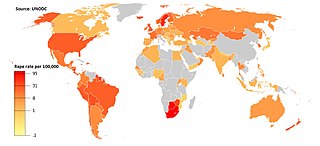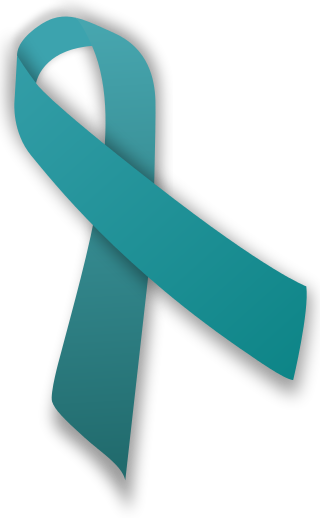
Victimology is the study of victimization, including the psychological effects on victims, the relationship between victims and offenders, the interactions between victims and the criminal justice system—that is, the police and courts, and corrections officials—and the connections between victims and other social groups and institutions, such as the media, businesses, and social movements.
Sexual assault is an act of sexual abuse in which one intentionally sexually touches another person without that person's consent, or coerces or physically forces a person to engage in a sexual act against their will. It is a form of sexual violence that includes child sexual abuse, groping, rape, drug facilitated sexual assault, and the torture of the person in a sexual manner.
Acquaintance rape is rape that is perpetrated by a person who knows the victim. Examples of acquaintances include someone the victim is dating, a classmate, co-worker, employer, family member, spouse, counselor, therapist, religious official, or medical doctor. Acquaintance rape includes a subcategory of incidents labeled date rape that involves people who are in romantic or sexual relationships with each other. When a rape is perpetrated by a college student on another student, the term campus rape is sometimes used.
Some victims of rape or other sexual violence incidents are male. Historically, rape was thought to be, and defined as, a crime committed solely against females. This belief is still held in some parts of the world, but rape of males is now commonly criminalized and has been subject to more discussion than in the past.
Victim blaming occurs when the victim of a crime or any wrongful act is held entirely or partially at fault for the harm that befell them. There is historical and current prejudice against the victims of domestic violence and sex crimes, such as the greater tendency to blame victims of rape than victims of robbery if victims and perpetrators knew each other prior to the commission of the crime. The Gay Panic Defense has also been used to justify violence against LGBTQ people.

Rape culture is a setting, as described by some sociological theories, in which rape is pervasive and normalized due to that setting's attitudes about gender and sexuality. Behaviors commonly associated with rape culture include victim blaming, slut-shaming, sexual objectification, trivializing rape, denial of widespread rape, refusing to acknowledge the harm caused by sexual violence, or some combination of these. It has been used to describe and explain behavior within social groups, including prison rape and in conflict areas where war rape is used as psychological warfare. Entire societies have been alleged to be rape cultures.
Date rape is a form of acquaintance rape and dating violence. The two phrases are often used interchangeably, but date rape specifically refers to a rape in which there has been some sort of romantic or potentially sexual relationship between the two parties. Acquaintance rape also includes rapes in which the victim and perpetrator have been in a non-romantic, non-sexual relationship, for example as co-workers or neighbors.
Rape is a traumatic experience that affects the victim (survivor) in a physical, psychological, and sociological way. Even though the effects and aftermath of rape differ among victims, individuals tend to suffer from similar issues found within these three categories. Long-term reactions may involve the development of coping mechanisms that will either benefit the victim, such as social support, or inhibit their recovery. Seeking support and professional resources may assist the victim in numerous ways.
Gregory M. Herek is a researcher, author, and professor of psychology at the University of California at Davis (UCD). He has conducted extensive research on prejudice against sexual minorities, and coined the term sexual prejudice as a replacement for homophobia to describe this phenomenon. Herek argued that using the term homophobia incorrectly assumes that negative responses to lesbian, gay, and bisexual people are founded in pathological, irrational fear, whereas psychological research indicates they are more accurately regarded as a form of prejudice. Herek is an openly and prominent gay psychologist. Herek is considered one of the most influential scholars of sexual minorities.
Sexual violence refers to a range of completed or attempted sexual acts in which the affected party does not or is unable to consent. Theories on the causes of sexual violence are numerous and have come out of many different disciplines, such as women's studies, public health, and criminal justice. Proposed causes include military conquest, socioeconomics, anger, power, sadism, traits, ethical standards, laws, and evolutionary pressures. Most of the research on the causes of sexual violence has focused on male offenders.
Victimisation is the state or process of being victimised or becoming a victim. The field that studies the process, rates, incidence, effects, and prevalence of victimisation is called victimology.
Campus sexual assault is the sexual assault, including rape, of a student while attending an institution of higher learning, such as a college or university. The victims of such assaults are more likely to be female, but any gender can be victimized. Estimates of sexual assault, which vary based on definitions and methodology, generally find that somewhere between 19–27% of college women and 6–8% of college men are sexually assaulted during their time in college.
The feminist pathways perspective is a feminist perspective of criminology which suggests victimization throughout the life course is a key risk factor for women's entry into offending.
Rebecca Campbell is a professor of psychology at Michigan State University. She is known for her research pertaining to sexual assault and violence against women and children and the effects of treatment by law enforcement and medical staff on victims' psychological and physiological well-being. Campbell has been involved in criminal justice research on the investigation of Detroit's untested rape kits, wherein DNA evidence obtained in thousands of rape kits was left in storage and not analyzed. She has received numerous awards for her work including the Society for the Psychological Study of Social Issues Louise Kidder Early Career Award (2000), the American Psychological Association (APA) Early Career Award for Distinguished Contributions to Psychology in the Public Interest (2008), the APA Division 27 Council on Educational Program's Excellent Educator Award (2015), and the U.S. Department of Justice Vision 21 Crime Victims Research Award (2015).

Sexual assault of LGBT people, also known as sexual and gender minorities (SGM), is a form of violence that occurs within the LGBT community. While sexual assault and other forms of interpersonal violence can occur in all forms of relationships, it is found that sexual minorities experience it at rates that are equal to or higher than their heterosexual counterparts. There is a lack of research on this specific problem for the LGBT population as a whole, but there does exist a substantial amount of research on college LGBT students who have experienced sexual assault and sexual harassment.
Lisa A. Goodman is an American counseling psychologist known for her research on domestic violence and violence against women. She is Professor of Counseling Psychology at the Lynch School of Education at Boston College. Goodman is a Fellow of the American Psychological Association, Division of Counseling Psychology.
Research consistently shows that the majority of rape and other sexual assault victims do not report their attacks to law enforcement. Reasons for not reporting include fear of reprisal, shame, uncertainty about whether a crime was committed, or a belief that an incident was not sufficiently serious enough to report. As a result, researchers generally rely on surveys to measure sexual violence that is not reported to the police. Estimates of campus sexual assault measured on surveys vary across populations and over time, however a recent review concluded that a "reasonable average" of around 1 in 5 (20%) of women were sexually assaulted during their time in college. And although much of the research on sexual assault has focused on college campuses, there is evidence that non-students of the same age are actually at higher risk than college students.

Apryl A. Alexander is an American clinical and forensic psychologist who is an associate professor at the University of Denver. Alexander directs students at the Denver Forensic Institute for Research, Service and Training, and engages in clinical psychology practice. She is co-founder of the University of Denver's Prison Arts Initiative where incarcerated individuals engage in a therapeutic, educational arts curricula.
Secondary victimisation refers to further victim-blaming from criminal justice authorities following a report of an original victimisation.
Kelly Cue Davis is an Assistant Dean, Professor, and Research Faculty member at Arizona State University in the Edson College of Nursing and Health Innovation who is best known for her work in "the role of alcohol in sexual assault perpetration and victimization."




